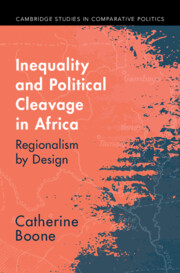Book contents
- Reviews
- Inequality and Political Cleavage in Africa
- Cambridge Studies in Comparative Politics
- Inequality and Political Cleavage in Africa
- Copyright page
- Epigraph
- Contents
- Figures
- Tables
- Preface and Acknowledgments
- 1 Economic Inequalities and Territorial Oppositions in African Politics
- 2 Region and Regionalism in African Politics
- 3 Endowment, Institutions, and Spatial Inequality
- 4 Regional Blocs and Bloc Voting in National Elections
- 5 Regional Hierarchies and Winning Coalitions
- 6 Territorial Oppositions in African Politics
- 7 Regionalism and the National Agenda
- 8 Conclusion
- Appendices
- References
- Index
- Cambridge Studies in Comparative Politics
5 - Regional Hierarchies and Winning Coalitions
Published online by Cambridge University Press: 18 April 2024
- Reviews
- Inequality and Political Cleavage in Africa
- Cambridge Studies in Comparative Politics
- Inequality and Political Cleavage in Africa
- Copyright page
- Epigraph
- Contents
- Figures
- Tables
- Preface and Acknowledgments
- 1 Economic Inequalities and Territorial Oppositions in African Politics
- 2 Region and Regionalism in African Politics
- 3 Endowment, Institutions, and Spatial Inequality
- 4 Regional Blocs and Bloc Voting in National Elections
- 5 Regional Hierarchies and Winning Coalitions
- 6 Territorial Oppositions in African Politics
- 7 Regionalism and the National Agenda
- 8 Conclusion
- Appendices
- References
- Index
- Cambridge Studies in Comparative Politics
Summary
This chapter explores relationships between regional economic advantage and regional political advantage, making two arguments. The first is that relative political advantage among the regional electoral blocs tends to map onto the economic hierarchy of regions. This conforms to the theoretical expectation that politically dominant blocs tend to be economic leaders as well (see Gourevitch 1979). A corollary is that when relatively advantaged regions are out of power, they are likely to constitute a rival electoral bloc or an opposition-leaning zone. The second argument analyzes the formation of national winning electoral coalitions. Evidence from the 12-country study suggests that national electoral coalitions are built mainly via the ability of incumbent blocs to mobilize electoral support in constituencies in the weakly organized non-bloc areas. The most common alliance structure is alliances of the extremes (richest and poorest regions) against the middle. Similar patterns of alliance have been noted for countries cleaved by high spatial inequalities in other parts of the world. These coalition patterns tend to reproduce regionalism in national politics.
Keywords
- Type
- Chapter
- Information
- Inequality and Political Cleavage in AfricaRegionalism by Design, pp. 149 - 167Publisher: Cambridge University PressPrint publication year: 2024



